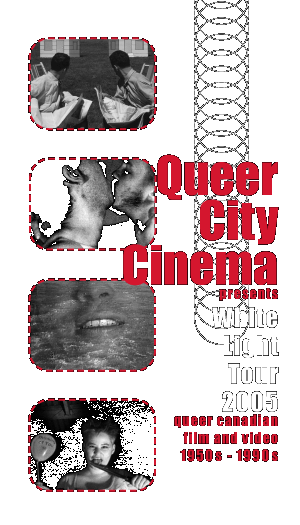












White Light 2 - 9:30 PM
Seventies: Emergence & Struggle
Curated by Richard Fung
I came out in the seventies. I had sex with a man for the first time in the seventies. I made my first gay video in the seventies. For me, and a whole generation of men and women, the seventies was a time of emergence.
That first video was a documentary about the Body Politic Free the Press Fund, a committee set up to defend the gay liberation magazine against charges stemming from the publication of Gerald Hannon's article on paedophilia, "Men Loving Boys Loving Men." The motto of The Body Politic was a quote from 1921 by the early German activist Kurt Hiller: "The liberation of homosexuals can only be the work of homosexuals themselves." The Nazis destroyed that homosexual movement, but Hiller's call to self-determination rang true for a new activism whose beginning we symbolically mark by the Stonewall Riots in New York in 1969. This movement blossomed in the seventies with the building of gay and lesbian identity, media, and commercial and communities spaces. It shared its framework of liberation with feminism, anti-imperialist activism, and various forms of anti-racism and ethnic consciousness movements. This was before the deconstruction of everything, when identity was something to strive for, and queer was still just a putdown.
The films and videos in this program present the art and activism of the seventies through a contemporary lens: queer eye for a gay and lesbian time. Paul Wong and Colin Campbell were pioneers in the art of video, which in Canada was born in the seventies. They were not yet publicly gay when these tapes were made, but both artists tease the viewer with sexual innuendo, Wong through his inter-penetration and shared bodily fluids with his then lover Ken Fletcher, and Campbell with a celebrity auto-interview of his campy Art Star character. Queer celebrity-or notoriety-is also at the centre of two very different films by Kay Armatage. Gertrude and Alice In Passing references Gertrude Stein and Alice B. Toklas, one of history's notable lesbian couples, in a formal experiment on cinema and literature. In Jill Johnston: October 1975, Armatage and co-director Lydia Wazana follow the author through crowds of adoring fans to confront the occasional antagonist. It is lesbian author as pop star as Johnston addresses earnest students and expounds during TV interviews. Wazana and Armatage capture the fevered activism of high boots and plaid flannel shirts.
For radical gays and lesbians in the seventies, the agenda was to be freed from the state and the family, not included in its conformity. "Not the church and not the state, women must control their/our fate" was the battle cry at the abortion rights rallies. Same sex marriage was not on the agenda; the well-behaved queers hadn't yet gained hegemony. Holly Dale and Janis Cole, who later co-directed several classic documentary interventions on the politics of gender and sexuality, made a student film centred on prostitutes, homosexuals, transvestites and transsexuals. And at the end of the decade, Michael McGarry crafted a red-hot manifesto on anonymous gay sex.
The seventies was not only a time of euphoric emergence, but of heated or sometimes silent struggles over how to be gay and lesbian, and even who had the privilege of being "out." Who had access to the media was another question. Paul Wong is one of the few non-white queer artists at this time as he was one of the few non-white media artists in Canada, period. The works and artists in this program don't simply reflect the seventies; they helped shape the politics, passions and artistic practices of that decade.
60 Unit Bruise
Paul Wong, 1976, video, 5:00 min.
Recorded in the era before AIDS, two men share a needle in a ritual that is at once clinical, comradely and sensual. An early classic by one of Canada's leading artists.
Gertrude and Alice in Passing
Kay Armatage,1978, 16mm, 8:00 min.
Exactly what the title describes, this landmark film, starring Jackie Burroughs and Anne Aglin, mirrors Stein's prismatic writing.
Sackville, I'm Yours
Colin Campbell, 1972, video, 14:40 min.
In one of the earliest and most enduring works of Canadian video art, Campbell's campy alter ego, Art Star, reveals the perks and pressures of celebrity in a New Brunswick college town.
Jill Johnston: October 1975
Kay Armatage & Lydia Wazana, 1977, 16mm, 30:00 min.
In October 1975, Jill Johnston, author of Lesbian Nation and Marmalade Me, blazed through Toronto with her girlfriend. This documentary captures the feminist community that coalesced around their presence.
Minimum Charge No Cover
Janis Cole & Holly Dale, 1976, 16mm, 11:00 min.
Audiences are made to identify with sexual outlaws in this provocative film by the directing duo who gave us such notable documentaries as Hookers on Davie and P4W.
In Black and White
Michael McGarry, 1979, 16mm, 10:00 min.
This incisive and erotic treatise on washroom sex was made in the first decade of gay liberation. That men in Canada continue to be arrested for consensual sex tells us that sexual liberation politics haven't lost their relevance.
Total running time: 79 min.